Black Educators and Entrepreneurs Inspiring the Future

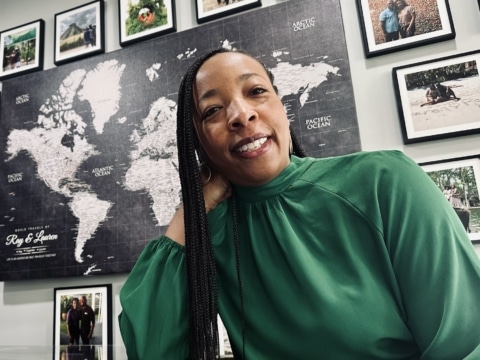
Lauren Bond
Early Childhood Consultant & Trainer
With over 20 years’ experience, Lauren has served in many roles such as teacher, program administrator, regional director, coach, and currently works as a consultant and trainer. As President of Bond Education Services & Training she is committed to equipping early childhood professionals to be their absolute best by providing knowledge and tools needed to provide excellence in early education and to lead with passion. Lauren is a curriculum coach, CLASS observer, a MD Accreditation validator, an MSDE and OSSE certified Trainer. She also works as an Expert Faculty trainer for ZERO TO THREE.
I love reassuring teachers that we can do this and we are going to have fun; that we will see those sparks and lightbulbs together.
Lauren Bond
When I was first starting in the field, I was in school and working for a home-based program to support children with disabilities. My first client was P. P was 2.5 years old and was being raised by his father and grandparents. While P had babbled as a baby, as time passed, he regressed into a nonverbal state and the doctors informed the family that they should prepare themselves for P never learning to talk.
One day, as I was working with P, I would touch a toy duck and ask him to touch the toy and say, “duck.” I noticed when I touched the toy, he would say something that sounded like, “duck.” I repeated touching the toy and saying, “duck” and he repeated after me. I was so thrilled; he was actually talking. He saw my joy, and he kept repeating, “Duck, duck, duck.” Grandma was in the next room. She heard and she was ecstatic! It was such a joyful moment.
It taught me that each child is amazing and when you put in the work, children will astound you despite what the doctors might say. P and his family also helped me recognize the importance of strong relationships with family. I stayed close to this family. They welcomed me as another member of their family, sharing in the growth and accomplishments of their child.
The work we do with children is often so hard and complex. In my work in classrooms and programs, I love reassuring teachers that we can do this and we are going to have fun; that we will see those sparks and lightbulbs together.
The brain is resilient. The brain will regenerate. Brains can move past trauma. One caring and nurturing adult can support the restructuring of a child’s brain and through joy and love allow the innate connections to emerge and grow.
Brain development can be intimidating, but when you understand the little things that work and support brain development, you can demystify it. As a trainer, I now know about mirror neurons, synapses, myelin sheets, the hippocampus, and I can say amygdala, but I don’t need to know all the vocabulary to describe what’s happening in the brain.
When I do professional development on The Growing Brain, I try to help participants realize that they don’t have to remember the words, they just need to remember the tactics that help nurture brain development. I might talk about how to nurture the development of the frontal lobe by giving children opportunities to problem solve, asking questions, or using complex language. I reassure providers that it doesn’t matter if you can’t remember the brain part or say the word, you just do the work that you know is going to facilitate children’s’ brain activity.
What the brain does in these early years is astounding. When providers and families are able to provide responsive relationships, a child’s brain can take in so much. It’s motivating. Just one activity can create so much for the child. It should drive you to want to go fight for brain engaging opportunities for all children.
Starting is such a big hurdle. It’s scary. It takes a leap of faith. When I started, I had just been laid off, and with that free time and space, I had the chance to figure out what was next. I had to follow my heart. I wanted to make a difference. I knew that if I started my own business, I was going to need to work to my standards, and I was confident I could grow my own joy.
Another big challenge was being alone in the process. I couldn’t turn to the person at the next desk over and ask what they thought about something. While I had a skill set for supervision and working in partnership with other roles in an organization (fiscal, HR, etc.). I did not know how to run a business. I had to figure out what all of these roles and responsibilities would look like in my own business.
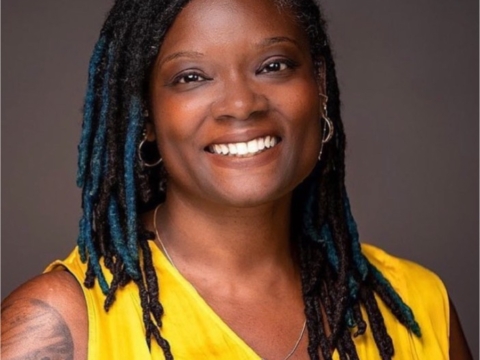
Kisa Marx
Early Childhood Practitioner and Advocate
With over two decades in the field, Kisa spent the last five years dismantling the mindset that creates oppressive dynamics in learning environments and prevents and charted a path toward healing, justice, and joy through a play and nature-focused philosophy. In late 2023, she founded The Play Lab Foundation, a non-profit organization provides humanity-centered, self-affirming, high-quality care for every child.
Kisa is an author, anti-bias curriculum developer, and workshop facilitator. She also sits on the board of Cayr Connections (Come As You Are), an organization whose mission is to increase the quality of life of neurodivergent individuals and their families by increasing the accessibility of trauma-informed, neurodiversity-affirming resources and learning opportunities for adults and children.
It is such a huge responsibility and a beautiful gift that early childhood practitioners are given every single day, for months, weeks, and years if we are lucky.
Kisa Marx
A challenge in our work has been to get adults (practitioners and caregivers alike) to see and understand the value in play as the main vehicle for learning.
Since school’s inception, the belief has been that learning happens to children. Young people enter an early learning environment as empty vessels, and the instruction is poured into them by their teacher. Play, on the other hand, is withheld and only granted as a treat, a reward, or a break from the work. But the research has proven that play is the work, and an invaluable asset for children to acquire knowledge and build upon the individual genius that accompanies every child.
Do the hard work necessary to deconstruct what has always been done to liberate your learning spaces. Audre Lorde said, “The master’s tools will never dismantle the master’s house.”
We must let her words remind us of our obligation to dismantle the rigid values, attitudes, and expectations that propel our children—black and brown children, in particular—down the preschool-to-prison nexus. Be flexible, be coachable, and do whatever it takes to rid yourself of a culture of compliance and control so that joy and liberation remain central to your philosophy.
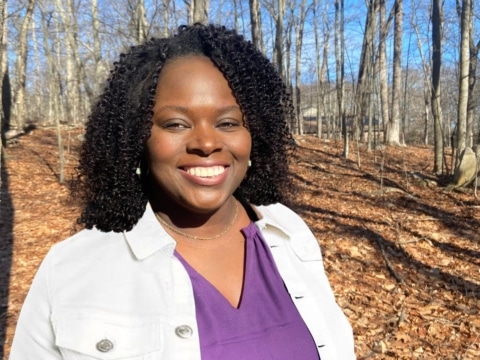
Khadija Lewis Khan
Executive Director, Beautiful Beginnings Child Care Center
For 24 years Khadija has served as the Executive Director of Beautiful Beginnings Child Care Center, which offers a range of high-quality programming for children from infancy through preschool.
Khadija fiercely advocates for increased investments in the early childhood education sector — often using her platform to campaign statewide and nationally on behalf of families who need access to affordable child care, and the dedicated educators who deserve to earn a livable wage.
The great thing about the first five years of a child's life is that, through a partnership with parents, early childhood educators can help set the foundation for a positive trajectory in a child’s life.
KHADIJA LEWIS-KHAN
Being able to help provide children with a safe, nurturing, and stimulating environment brings me joy. My team and I feel a deep responsibility to that mission and we are proud to offer high-quality learning programs for children from diverse racial and economic backgrounds. I get to see the amazing impact early educators have on the growth and development of young children and the positive effect that a high-quality program has on families.
We believe children succeed with love, adequate resources, and engagement. And we bear witness to the realization of that vision through successful outcomes. When our graduates come back as young adults to intern or teach in our programs, or when families keep in touch with us to let us know how their children are happy and thriving. They often credit their child’s experience at Beautiful Beginnings as an influential factor in that path to success.
Early on in my career I became interested in advocacy and began serving on boards and committees in the field, as I saw the need to break down barriers to providing high quality early childhood education programming especially for communities with the highest needs. The great thing about the first five years of a child’s life is that, through a partnership with parents, early childhood educators can help set the foundation for a positive trajectory in a child’s life.
Skilled and dedicated early childhood educators are the key to creating successful outcomes. I have tremendous gratitude for our team’s dedication to the children and families in our program. Our administrative and teaching teams subscribe to a growth mindset. Although many of us have been working in the field for years, we are committed to staying up to date on best practices. We do this by seizing many opportunities to invest in training, continued education, and professional development.
More than one third of our team are currently enrolled in college courses to advance their education at varying levels. They are working to obtain CDAs, associate degrees, bachelor’s degrees, certification and even master’s degrees. In addition, being an Early Head Start partner site and a Rhode Island preschool program also helps us continue to assess and reflect on how we deliver quality programming and keep up with best practices in the field.
I recommend spending time in high-quality programs. Speak to administrators and teachers in the field. Do your research on the challenges and opportunities in this sector. Investigate diverse funding models and how they can work to support quality in your program. Develop your philosophy – explore how children learn and how you want to engage families and interact with the community.
It’s also important to be intentional about what kind of community you want to build within your program. And lastly, choose your area of service wisely. Make sure that you chose a spaces which is easily accessible to the families you are trying to serve.
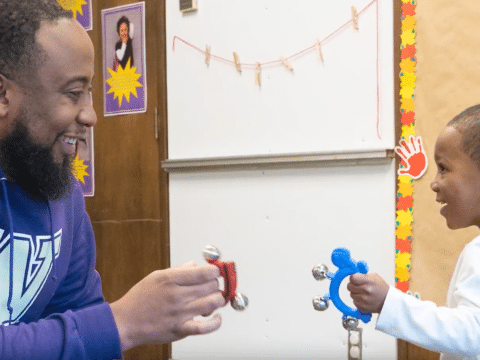
William L. White, Jr., PhD
Interim Associate Dean of Workforce Instruction, former Director of My Brother's Teacher
William is currently the interim associate dean of workforce instruction at North Seattle College. Prior to this role, Dr. White was the visionary and director of My Brother’s Teacher at the University of Washington, with a mission to diversify the early learning workforce by recruiting male high school Black and brown students from the Greater Seattle area to complete college coursework in early childhood education at North Seattle College (NSC) and internships in Seattle’s early learning programs.
You have to believe and understand that others may not understand or respect what you’re trying to do, but you must keep going and be the change you want to be.
William White
My advice is to do it! Seek out a team that will help you get to the finish line, because it can be a lonely space when trying to really map out your dream organization.
When I began building My Brother’s Teacher, it was many days and many nights of sitting in a room with my laptop and whiteboard, writing and erasing. It was many early mornings of sitting in coffee shops doing literature reviews to make sure what I was creating would be different than anything anybody was doing in the world.
I also made sure to put my due diligence by asking many peers and community members their thoughts. I went to those I wanted to impact and asked their advice on the program. You have to believe and understand that others may not understand or respect what you’re trying to do, but you must keep going and be the change you want to be.
Lastly, protect your intellectual property. Make sure to trademark all your work so you can have true ownership of your intellectual property and work.
As an early childhood special education teacher, the most challenging hurdle in my first year of teaching was helping other teachers understand children with disabilities are just as capable as other children. Many teachers I worked with then didn’t believe students with special needs are capable of passing the same assessments as their students in the general education classroom.
When I began studying and differentiating my instruction, the students began to achieve at the same level and sometimes higher than those in the general education classroom.
Advancing equitable access to the joy and wonder of learning.
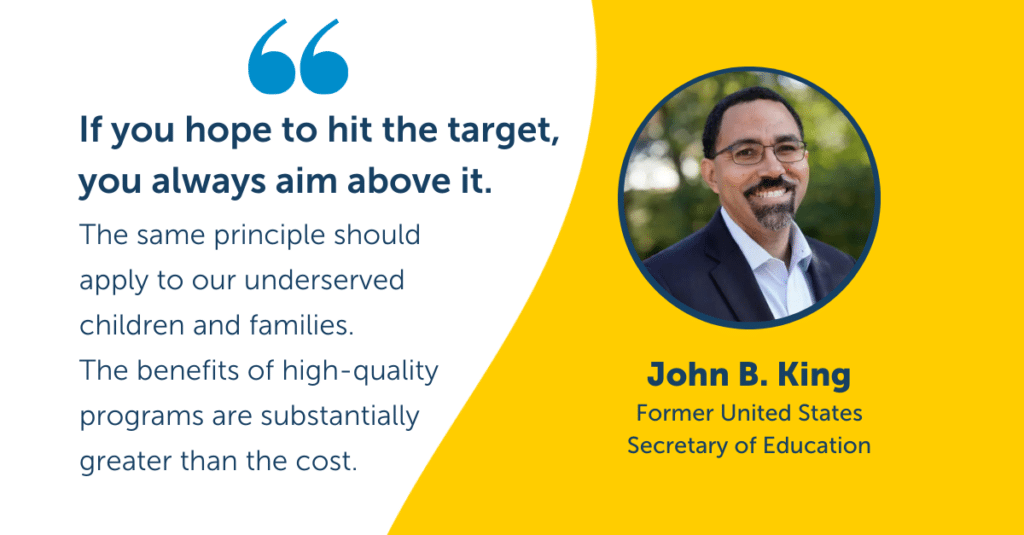
John B. King, Jr., EdD discusses his experiences as a classroom teacher and U.S. Secretary of Education while uniting early childhood educators on the mission to advance equity for young children.

